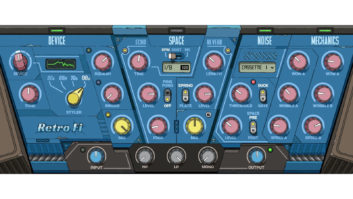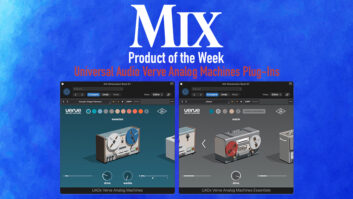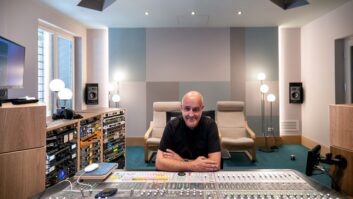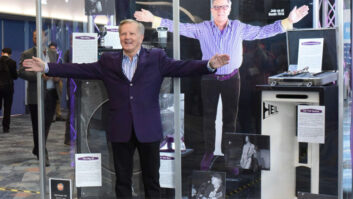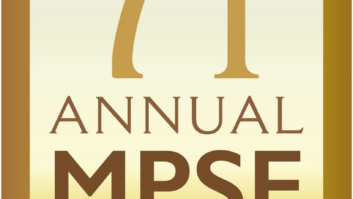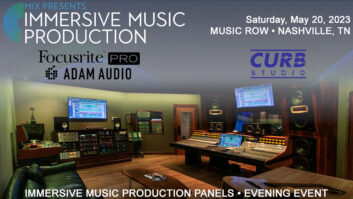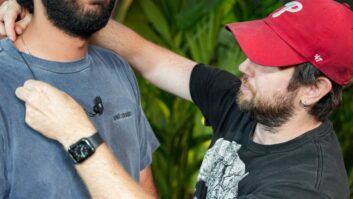The Buzzcocks launched their career back in 1976 with a self-distributed, DIY EP entitled, Spiral Scratch. Since then, after signing their first record contract on the day that Elvis died, they’ve blazed a relentless trail of eight highly melodic and energetic albums that have stood the test of time. Their trademark sound earned them the respect of bands in both the U.S. and abroad, and it isn’t a stretch to say they created the archetype for groups like the Libertines, the Arctic Monkeys, even Green Day.
The group now comprises two original members: guitarist/vocalist Pete Shelley and guitarist Steve Diggle. Pete and Steve form the basis of the Buzzcocks’ trademark guitar sound, still instantly recognizable and original. Pro Sound News caught up with primary songsmith, Shelley, to discuss their latest critically acclaimed effort, Flat Pack Philosophy, as their tour bus made its way to Albuquerque.
On the Evolution of the Buzzcocks’ Recording Technique:
Love Bites and Another Music in a Different Kitchen, some of our earliest records, were done completely differently than we do today. They were more live and immediate: two or three basic tracks per day, a few days for overdubs, vocals and mixing—that was it. Now we’re getting used to working with Pro Tools a lot more, and this has helped. Pro Tools is great working through arrangements obviously, because at the time you lay down the track, you may realize that you’ve got too many verses. If that’s the case, you can easily reverse that, make all the verses disappear and alter the sequence. This ultimately can result in a better idea.
On Recording and Producing Flat Pack Philosophy:
We tracked it at Southern Studios in England, near our homes—Southern has the basic required equipment and a good engineer. That’s all we need, really. Our bass player, Tony Barber, who did the last three Buzzcocks albums, produced it. It’s good because he understands the history of the band. Also, he’s sensitive to the things that we are and didn’t try to make us sound like the band that we aren’t, which perhaps sometimes many producers are guilty of [laughs]! As for the mixing, I left this to Tony and came in only occasionally to make suggestions. We started mixing at Southern [U.K.] then ended up at Woodbine, which was better to get the sound we were after. It was a lot more focused and more precise.
This album took a lot longer than the previous ones we’ve done. Part of the reason for that was by the time we finished the initial recording session, I hadn’t come up with any lyrics for the vast majority of the tracks—I had little bits here and there, but not enough to lay vocals down. We went in about a year later to finish the album. So all in all, it probably took a few months compared to say Love Bites, which took about two or three weeks from start to finish.
On Their Trademark Guitar Sound and Stereo Placement:
For our guitar sound, we just tend to use whatever is on hand in the studio. I always like to try an odd combination of old classic amps. As far as guitars, I usually play a Gibson, but I was recently given an Eastwood—they’re made in Canada and they have an old classic guitar design, but made of modern-day materials. As for the guitar mix, you’ll often hear Steve in the left channel and myself in the right because that’s the way the band is settled. This orientation is indeed to preserve the sense of what it’s like live. That said, I often argue with the drummer whether or not the drums should appear in stereo as he hears them or as the audience hears them.
On Writing and Capturing New Songs:
There are times you think that the new tunes can’t live up to the old ones, but it’s only natural to think those things. “ESP,” “Ever Fallen In Love,” “Autonomy,” and all the others were at some point just ordinary songs—they’ve acquired a reputation over time.
I avoid putting songs down to a small recorder entirely—I allow myself the luxury of forgetting. If you don’t remember it, it wasn’t worth keeping. I think it helps that all our songs have passed that one test with me. They are memorable, and therefore when other people hear them, they can remember them as well. Sometimes you can take things too seriously, thinking that every note you write is so important. But it’s fun to mess about with ideas sometimes rather than being too retentive.
On Starting Out Independently and the DIY Ethos:
In those days [1976], in Manchester where we lived, there were no record companies. You had to travel down to London to even find a record company. We thought, “Why don’t we just do our own record once?” because we sensed there was a commercial following to the kind of music we were doing. We did manage to get something out, and it ended up that people did like it and it started the ball rolling.
It’s never been that difficult to get your records into the stores. The difficulty is getting people to know the record is in the stores. With the internet, it’s easier to get your stuff to market, but you still have same old problem: How do you get people to know what you’re doing? John Peel was very good for us because he played our songs, and people could hear what it was like. He was very passionate about music and not just a celebrity DJ. It was interesting doing the Peel sessions, because it gave us free studio time and it was a good venue to try new songs. “Late for the Train” began as a demo on the Peel sessions.
On the Fabric of the Songs and Early Influences:
One of the points in the punk manifesto was to make the songs relevant to everyday life—so that songs weren’t from some mythical state or mythical place. And it was about everyday life, and making everyday life into the art—it was coming from a real place. I was standing on the shoulders of giants, with people like Jonathan Richman. Our early influences were the Velvet Underground, the Stooges and Alice Cooper. I used to listen to Sparks as well. These days, it’s harder to tell what I like. I’m a bit more cynical and skeptical before accepting what I hear.
On Late Middle-Aged Touring:
We’re having fun. While it looks OK on paper, it’s very tiring! Yesterday, we were playing in Denver, and I was having a hard time keeping up with the breathing—it’s a mile high, and you don’t realize how it can impact your breathing until you’re in the middle of the set. Right now we’re on our way to Albuquerque. We have some festivals to do in Britain in August, then we go to Australia and Japan in September where we haven’t been in 3 1/2 years. It’s been 10 years since we were last in Tokyo, so it will be good going back there again where there is sure to be some new faces in the audience since we last visited.
On the Group’s Longevity:
I think it’s the songs that do keep us going. The songs have always been our bulldog strength; at the moment, we’re touring and playing half of the new album, which we feel is equally as good. In June, we did 30 dates on the Warped tour—there were loads and loads of bands that did covers of songs like “Ever Fallen in Love.” On the last day of the tour, as we were doing “Ever Fallen in Love” all the other bands got on stage and were singing along. I lost count of how many people were there.
This interview originally appeared in the August, 2006 issue of Pro Sound News as “Music, Etc,: A Different Kind of Session.”

